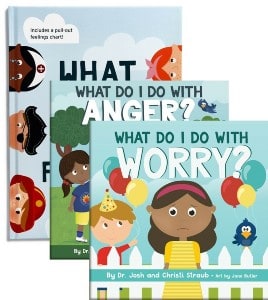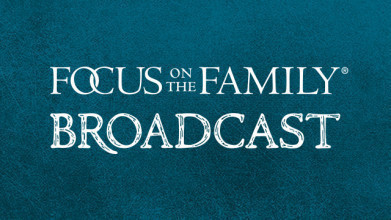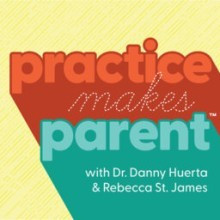Preview:
Dr. Josh Straub: So when our kids are overwhelmed, our ability to be emotionally safe helps calm their brain so they can think straight, and it’s thinking straight that leads to every major outcome we desire in our kids.
End of Preview
John Fuller: We all want our children to thrive, and you’re gonna get some great ideas on how to help them do that on today’s episode of Focus on the Family with Jim Daly.
Jim Daly: Well, we aired this program last September, and the response was so outstanding that we thought we should air it again.
John: Mm-hmm.
Jim: Uh, today’s guest is Dr. Josh Straub. He’s an author, family coach, and an expert in emotional intelligence. And he has some fascinating insights on how to help our children process their own emotions by making your home a safe place to share those feelings. It’s really good stuff.
John: I’d agree. And here’s Josh Straub, speaking to a gathering of our Focus staff on Focus on the Family.
Josh: Not long ago, uh, Christi and I, I had gotten the mail and there was a bill, a very unexpected bill in the mail, and I took it in and I laid it down in front of Christi and I looked at her and I’m like, “What are we gonna do? I don’t know how we are going to pay this bill.” We were not expecting this bill. Like, I don’t know what we’re gonna do next. And she’s like, “Josh, why do you always get like this?” And I said, “Do you realize how much food our kids are eating these days? Like, we gotta figure this out.” And she said, “Josh, you’re absolutely losing your mind.” I said, “Yes, I am losing (laughs) my mind.” So I go into my prayer closet because I’m losing my mind. Meanwhile, Christi’s on the phone getting the bill reconciled and figured out so that my mind can calm down.
But isn’t it true how often we as adults get worked up over things because fear and anxiety start to enter into our minds and we start taking it down a road that we never need to take it down? And then how it starts to impact our relationship with one another? You know, Christi and I experienced this early on with our kids. You know, we were both, uh, we thought we were pretty well set when we got married. I was 30 by the time we got married. Christi was 26. We had our patterns figured out, and then all of a sudden our greatest opponent came into our marriage weighing eight pounds and one ounce. And you wanna talk about ev- I mean, you talk acid reflux, colic, stomach allergies. We couldn’t figure out, by the time Landon, you know, is two, we thought we were doing a little bit decent.
And we thought that once you had a hard baby, you were gonna have an easy one. Well, Kennedy, our daughter, came into the world and she was more difficult than our first one. Easy and baby we’re not synonymous in the Straub household. And so what I started to do is while we were in this season of our lives, our brains are outta sorts. We’re not getting any sleep. It’s kind of like the bills are like, you know, a bill comes in the mail or whatever it is, or a baby’s not sleeping at night. You can’t figure life out. And all of a sudden you start to take a criticism from your spouse and you start to take it personally. And next thing you know, rather than becoming teammates in your marriage, you’re each other’s enemy because your brain isn’t calm, it’s overwhelmed. You don’t know what to do.
You’re feeling more and more alone. Imagine we as parents, imagine we as adults feeling so overwhelmed in our brain, not knowing what to do, how much more that is as it translates into our kids’ brains who don’t even know how to label emotion yet. And, and so the talk today, what we’re talking about, how do we set the tone for an emotionally safe environment? Because when we were in those early years, I went back into the research and I started to look at the data. I wanted to see what will have really mattered when we… when our kids are older, when, when we’ve gotten them out of the house. To raise kids who love God and love others, to raise kids who get married, stay married, and, and really enjoy their marriage. And every single thing, every single outcome that I looked at came back to this one primary factor, and that was emotional safety.
The ability of us as parents to be able to enter into our children’s world and help them tell their story. And so today what I wanna do is I wanna just walk through five key ways that we can do that, five key ways that we can establish an emotionally safe environment. And the reason that this is so profound is because I want you to think about this for a second. What happens is that when our kids are in an emotionally safe environment, when their brains are overwhelmed, when they’re feeling worry or fear or, uh, um, sadness or grief or anger, when they are over and when their brain is in overdrive, our ability as parents to be able to enter into their world and help them write their story has a calming effect on the brain. So when our kids are overwhelmed, our ability to be emotionally safe helps calm their brain so they can think straight, and it’s thinking straight that leads to every major outcome we desire in our kids.
So how do we do this? What does this look like? How do we enter into our kids’ worlds and help them tell their story? Number one, we lead in grace, and we follow in truth, I wanna anchor us in scripture because I believe Paul was one of the very first people who understood the power of neurobiology. If you look at Philippians chapter four, he says this, he said, “Let your gentleness be evident to everybody the Lord is near.” Therefore, be anxious for what? Nothing. But in everything, by prayer and petition with thanksgiving. Gotta have gratitude. The reason gratitude is so important is neurobiologically. It’s actually been found that gratitude actually pushes anxiety out of your brain. Gratitude and anxiety cannot coexist at the same time in the brain. And so Paul understood with thanksgiving, present your request to God and the peace of God, which surpasses all understanding, will keep your hearts and your what? Minds in Christ Jesus.
What happens is, is we go to God in prayer, and even though he might not answer our prayer requests the way that we want him to, he will answer them in the way that’s best for us, because he knows what’s best for us, and we can thank him for that. And then the peace of God, which surpasses all understanding, keeps your hearts and your minds in Christ Jesus. “So that finally, brothers and sisters,” verse eight, “Finally, brothers and sisters, whatever is true, whatever is excellent, whatever is noble, whatever is praiseworthy what, think on these things.” I think Paul understood that when we are anxious and overwhelmed, we can’t think straight. I can’t think straight about the bills coming in. I can’t think straight about our kids acting out. I can’t think straight when all these things are happening until I am calm, until I experience the presence of the Lord Jesus and can calm my brain.
Which is why all of this major research points to this idea that for our children to be able to in a finite way, I genuinely believe we as parents in a finite way, are a peace that can help calm our children’s brain when they’re anxious and overwhelmed and can’t think straight, we enter into their world to help them tell their story. I remember working with a dad of a 14-year-old, and she really wanted to go to a Friday night football game. And her dad said no. And so she came home, and she looked at her dad and she said, “Dad, I hate you.” And she went storming to a bedroom. Now, you can imagine as a parent, how is your brain doing right now? How is your fight, flight, and freeze? How is your amygdala doing in this moment towards your 14-year-old? Because I know for me, a lot of times what we end up doing is we tend to overreact and will lead in truth rather than in grace.
So what we do is we say, “Don’t you ever speak to me that way again. You go to your room, I’m taking your phone for a month, and no, you’re not going to that Friday night football game. Do you understand me?” But the posture of emotional safety, the posture of speaking to our kids, leading in grace and following in truth, is our ability as parents to be able to enter into our kids’ worlds and saying, “Honey, what is it about that Friday night football game that matters to you so much?” And what that dad found out about his daughter is that she had been rejected by a group of friends that she used to hang out with in the school year prior. And she would see them posting pictures on Instagram and Snapchat of them hanging out without her. And this was the first Friday night they invited her to be a part of something and her dad said no.
You see, when our kids are anxious and overwhelmed, or they’re behaviorally acting out, usually there’s a deeper emotion happening within underneath. And our ability to lead in grace as Jesus did with the woman at the well, as Jesus did with the woman caught in adultery, as we see throughout the gospels, the way Jesus shows up in grace and putting relationship first lead in grace and follow in truth, has a calming effect on our kid’s brain so that they can problem solve about what is the right thing to do, whether or not I should go to this football game or not. And what this dad did was he entered into her world, he gave her a consequence for the way that she disrespected him, but they were to… able to come together and problem solve for what, what… whether or not she was gonna go to that football game that night. And so, as we think about how we can enter into our kids’ worlds, uh, my dear friend and mentor, Dr. John Townsend wrote this.
He wrote that, “Truth without grace will always lead to condemnation. Truth without grace will always lead to condemnation.” And you know, as an adult what that feels like. And so think about even the environment we’re raising our kids in, how that translates into our children’s brains, which leads us to number two, talk about emotions. Allow emotional vocabulary to be the norm in your home. I remember working with juvenile delinquents years ago, and one of the very first things I would do when I would meet with them is I would give ’em a feelings chart. And the reason I would give ’em a feelings chart is because it was my job to get them to feel remorse for their victims. But the reality is, is you can’t feel something that you yourself were never allowed to feel to begin with. And so a lot of these juvenile delinquents never had a, a father figure or an adult figure in their lives enter into their world and allow them to feel anger or their sadness or their grief or their fear without punishing them or dismissing them or minimizing that emotion.
John: This is Focus on the Family with Jim Daly, and that’s Dr. Joshua Straub. And we’re offering an exclusive three book bundle that he’s written for children about feelings. And we’re offering that to you for a monthly pledge or a one-time donation to the Ministry of Focus on the family today of any amount. And, uh, when you make that donation and request that exclusive three-book bundle, we’ll include a free audio download of the entire presentation from Josh as well. Donate and request those at focusonthefamily.com/broadcast or call 800 the letter A and the word FAMILY. That’s 800-232-6459. Let’s return now to more from Josh Straub.
Josh: So talk about emotion in your home. We just, uh, had this issue, um, not long ago where, uh, our daughter had come home from being with her friends and, and we were with adult, the adults and the kids were all together. And Kennedy came home, and she was just overwhelmed by emotion that day. She was acting out, she was disrespectful, and she’s our sweet little girl. Like this is just not in her character to be acting like that. And so one of the things that, uh, we were doing is we were being normal adults in our busyness, and we were, uh, you know, just disciplining her and coming down hard on her and saying, “Don’t you treat us like that, and why are you acting like this?” You know, because that’s what we do when we want to manage everything.
And so we’re actually, uh, not practicing what we preach, we’re leading in truth and not in grace. And so later that evening, as my incredible wife, uh, does, she is tucking Kennedy in the bed and she pulls out our, What Am I Feeling? book. And in that book, uh, at the end, at the back, there’s a, a pull-out feelings chart. And she said, “Honey, did anything happen today?” Because her, her behavior was just outta character. And she said, “Honey, what are you feeling? What are you feeling right now?” And Kennedy’s little finger went to anger. And, and, and Christi asked her, she said, “Is there anything else that you’re feeling right now?” And Kennedy started moving it. And she went to embarrassed and then to sad.
And, and Christi said, “Honey, what happened today? Did something happen that allowed you to be embarrassed or that made you feel this way?” And that was the moment which Kennedy described, where two of the girls she was playing with wanted to go into a bedroom and play by themselves. And they let Kennedy outside and said, “We’re just gonna play by ourselves and you can stay out here for a little while.” Kennedy got rejected. But it would be very easy if we didn’t have emotional vocabulary in our home to, uh, not have a place for our kids to describe that. And we instead come down hard in truth and in discipline rather than giving them a space to be able to feel like they can talk about what really happened to them.
And so allow emotional vocabulary, whether you use a feelings chart or the, like, allow emotional vocabulary to be an important part of your day. Use this in your marriage as well. Practice it in your marriage. We tend to say, if you can, instead of doing highs and lows for the day, do one positive emotion and one, uh, not so fun emotion, an uncomfortable emotion that you might have had that particular day. And use that around the dinner table. Use that as an opportunity to really enter into the heart of your spouse and also into the story of your children so that they have the ability to be able to talk about emotions, which leads us to number three. Celebrate who they are. Don’t mourn who they’re not.
This is one I remember a number of years ago, my friend, uh, Frank, uh, had come in to visit us in Tennessee. He was living in California at the time, and he was working on a book, and he wanted me to help him with it. And so he flew in on a red eye and it’s like 7:30 in the morning. He lands, he gets to our house. And at this time, our son Landon was three at the time, and Landon’s dancing around the house and he’s got this guitar, he’s dancing around the house, he’s singing as loud as he can can at 7:30 in the morning to the top of his lungs, making up these songs. And of course, my friend Frank is there after a red eye, you know, being up all night and trying to get a cup of coffee. And I’m like, I’m apologizing for him.
I’m like, it’s like, I was like, “Landon, you gotta relax.” And I’m apo- I’m like, “Frank, I’m so sorry that this is happening.” He said, “Josh, hold on a second.” He said, “What we tend to find annoying in our kids’ behavior is the very thing that they’re passionate about or they’re strong in, and we tend to look at it as annoying behavior.” He said, “You gotta start paying attention to these things.” He said, “I’ve never seen a four-year-old make up songs and run around and dance and play the guitar the way that your son does. Don’t shut him down with it.” And at the time, I had him in t-ball because guess what? I played baseball. I didn’t play guitar, so I was having him play baseball.
Well, later that fall, I asked Landon, I said, “Hey, buddy, I have a question. Would you rather play t-ball or take guitar lessons?” And his face lit up like a Hallmark Christmas tree, you know, and a Hallmark movie. He just lit up and he said, “Dad, I want to get… take guitar lessons.” So often what we end up doing, though, with our kids is we end up impressing our own parental fears onto our kids because we’re afraid that they’re gonna turn out not smart enough, not talkative enough, not athletic enough, not musical enough, not whatever enough it is that we tend to think that our kids are gonna turn out. And we allow our fears to drive and dictate how we’re parenting them.
Celebrate your kids for who God has created them to be. In Proverbs it says, “Raise your children in the way they should go, not the way you want them to go. And when they’re old, they will not depart from it.” I had a mom of a 12-year-old son come up to me after speaking one time and she said, “Josh, my son is learning how to rap, and I have no idea what to do.”
Audience: (laughs).
Josh: And I looked at her and I just went through a list of questions. Uh, you know, 1 Corinthians 15 says that, “Bad company corrupts good character.” “You know, is he hanging out with kids he shouldn’t be hanging out with?” And she said, “No, he’s hanging out with youth group kids. They’re good kids. I know their parents.” I said, “Okay, is he listening to, uh, lyrics that are, you know, uh, degra- degrading to women or that are violent or that he shouldn’t be listening to and consuming?” She said, “No, he’s listening to Lecrae.”
Audience: (laughs).
Josh: And I said, and I’d just gotten done speaking. So I got down on my knee in front of her and I said, “I only have one piece of advice for you. Learn how to rap.
Audience: (laughs).
Josh: Because if you don’t, your son will learn how to rap with other kids and it’ll build a wall between your heart and his.” So for myself, I’m, you know, entering into playing the piano as much as I can with my kids, entering into their world, practicing soccer, which I’ve never played before in my life, uh, entering into their world so that I can build, uh, what, what they love doing and pursue the heart of who God has created them to be rather than mourning. Which leads us to number four, right your wrongs, right your wrongs.
I remember coming home from, uh, work one time, and this was a night where our kids had not napped that day. They were overwhelmed, they were in school. Christi was done with them. And she just said, “Josh, they’re yours now.” And so she went into the laundry room to do laundry therapy because at least it was the only thing she did that didn’t have to involve trying to talk to somebody who didn’t know how to tie their shoe. And so I am there, the laundry rooms across from my son’s bedroom. I had it all under control, I promise, I really did. But their decibel levels were getting higher and higher and they’re running all over the place. And I wasn’t apparently moving fast enough for Christi, uh, because she steps out. So the kids’ decibel level is about here. Christi steps out and has to go here with the decibel level to, uh, you know, get above them to get to me.
And she said, “Josh, are you gonna do something with them?” Which the kids then go up to here. And I’m the type of guy that likes to drive down the road with no… listening to nothing. ‘Cause s- I get very overwhelmed by a lot of noise. And so now all of a sudden decibel levels are up to here and up to here. My amygdala’s going off and I just yelled, “Stop! Everybody stop!” And I looked over and I saw our son’s bottom lip start to quiver. And I knew in that moment I had made a mistake. And I got down into their little world, I got on my knee, and I just said, “I’m so sorry for the way dad just yelled at you.” You see John Gottman found in emotion coaching kids in his research that if you can get this emotional safety thing right, just two out of five times that you can still get the outcomes you’re looking for in your kids. Guys, Shaq shot better than 40% from the free throw line.
Audience: (laughs).
Josh: 40%. Why? Because the research said to the word called repair is the ultimate of relationships. Do you know what the Bible calls it? Forgiveness. And it tells us to practice it a lot. When we mess up as adults, our ability to enter into our kids’ world, apologize for, for our specific offense and ask our kids how we can make it right, it models for them, number one, that we’re not perfect. It shows them what to do when they’re not perfect. And it also helps them understand that we do not expect them to have perfection, but to be able to know how to seek forgiveness when they have been wrong as well. Now, I was able to make that right. I had to go make it right with my wife after that, right? How well do we enter into our, in as adults, into our spouses’ worlds as well to make things right?
We have to right our wrongs, which leads us, by the way, I hope that’s a, a guilt free drop for y’all. Two out of five times as parents, we can still get the outcomes we desire in our kids. Number five is this: Prioritize who you’re becoming as an adult. Prioritize who you’re becoming. There was a meta-analysis done, uh, a number of years ago that looked at the top 10 parenting strategies to get the outcomes we most desire in our kids. And a meta-analysis is where you take a whole bunch of studies and you put ’em together and you look at what do the date, what does the data show overall in all of these studies and what… And then they ask parenting experts what they thought the data would show. What are the top parenting strategies to get the outcomes we most desire in our kids? And all the experts got it wrong as well.
Of the top three parenting strategies to get the outcomes we desire in our kids, number one was love and affection. Number one was love and affection. Number two, number two was a parent’s ability to manage his or her own stress. A parent’s ability to manage his or her own fight, flight, or freeze or amygdala in overwhelming moments. Number three was a parent’s ability or how you treat your spouse. It was how you treat your spouse or how you treat a co-parent in a divorce situation. I would argue of the top three parenting strategies to get the outcomes we most desire in our kids not one of ’em has to do with a direct relationship with our kids. They have everything to do with who we’re becoming as adults.
Even love and affection. What’s the Bible say? We love because he first loved us. There’s a reason that when you go to therapy, one of the very first things that you’re talking about is your relationship with your parents. How well you were loved. When I met with the juvenile delinquents and I had to help them feel remorse, I had to help them feel loved. That they are loved. To know that they are loved. And a lot of times what ends up happening is, is we have to get back into step understanding how well we are loved. Because listen, if we wanna raise kids who don’t yell, we can’t be yelling. If we want to have kids who aren’t on screens, we can’t be on screens. If we want to raise kids who experience the love of Jesus, we have to show them what it’s like for us to experience the love of Jesus.
You can sum up all… I can sum up all of parenting research into one primary conclusion. And that is this, that our kids become who we are. And so for what, uh, Christi and me do, we, or Christi and I do get my grammar right, what we do is we go to therapy on a regular basis because I don’t genuinely believe that therapy is for crazy people. I think it’s for broken people. And I haven’t met one person on the planet who’s not broken in some way. We have to find people that we can talk to, whether it’s a therapist, whether it’s a coach, whether it’s a pastor, whether it’s friends around the campfire, sitting in circles with people who will listen to our motion, who will affirm who we are.
But then also it doesn’t just start there, it also starts with experiencing the love of Jesus. It starts with a rule of life. What is your prayer life like? For so many years and throughout my life, I understood God’s love for me. I had the knowledge of God’s love for me. But it’s only until been recently that I’m learning to experience the love of God for me through prayer. A daily examine. Silence. And I don’t know what it is for you, but I just genuinely want to admonish all of us that to experience, to create emotional safety. The top parenting strategy to get the outcomes we most desire in our kids is love and affection. And we love because he first loved us. Because just as our children deserve somebody to love them and enter into their world to help them tell their story, so too does every parent.
John: Such powerful insights from Dr. Joshua Straub on today’s episode of Focus on the Family. And, uh, that’s one of our most popular programs of 2023.
Jim: Well, I found this topic to be so fascinating, and if you’re a parent or grandparent who would like to implement these ideas, uh, let me recommend that you get a special bundle of the three books that Josh has written to children ages four to eight. The bundle is called What Do I Do with My Feelings? And these books will provide a biblically grounded way for children to verbalize their feelings while developing empathy and self-control.
John: Yeah. You’ll, uh, really appreciate these books. Uh, two of them deal with anger and worry, which really seem to have become big issues for children these days. Um, so request your book bundle when you call 800 the letter A and the word FAMILY. Uh, What Do I Do with My Feelings? Request that. And when you call 800-232-6459 or, uh, stop by focusonthefamily.com/broadcast.
Jim: I hope you know Focus on the Family is here to help your family thrive in Christ. That’s our mission, especially now that the culture seems to be, uh, so hostile toward our values. Every day we get calls from couples who are struggling to nurture their marriages, parents who want to raise godly children and expectant mothers who need love and support so that they can choose life for their pre-born babies. When you make a pledge of any amount, we’ll send you the three book bundle from Dr. Josh. And if you can’t make a monthly commitment right now, we understand. A one-time gift works too. We just want you to have these great books for your children or your grandchildren.
John: Yeah. The book bundle also includes an illustrated feelings chart so your child can easily point out their mood. Request that when you call 800 the letter A and the word FAMILY, 800-232-6459 or visit focusonthefamily.com/broadcast. Next time blogger and homeschooling mom, Kristi Clover shares tips on organizing the chaos in your home.
Preview:
Kristi Clover: To find your motivation to do anything, you have to understand your why and that’s important. So if you kind of go back to that, like, you know, why do you want to take care of the home? You know, why is your home important? You know, so everything that’s good in life takes a little bit of effort.
End of Preview:























